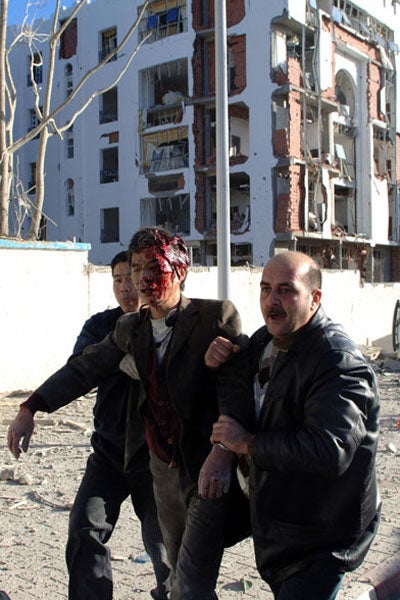Algerian bomb blasts linked to al-Qa'ida

Nearly 70 people were killed in Algiers yesterday when two car bombs exploded within minutes of one other. The attack appeared to have been staged by al-Qa'ida's north African wing and specifically targeted the United Nations operation in the Algerian capital.
UN officials said two drivers working for its refugee agency had been killed. Another three UN workers were feared dead, and at least 10 more were still missing, as rescuers continued to comb through the rubble in the leafy, upmarket neighbourhoods of Ben Aknoun and Hydra, home to many diplomats and foreigners.
Ban Ki-moon, the UN secretary general, said: "Words cannot express my sense of shock, outrage and anger at the terrorist attack. This was an abject, cowardly strike against civilian officials serving humanity's highest ideals under the UN banner: base, indecent and unjustifiable by even the most barbarous political standard."
Algeria's Interior Minister said he was sure the bombs had been detonated by militants working for al-Qa'ida in the Islamic Maghreb (Aqim), and although there was no immediate claim of responsibility, analysts agreed there was only one likely culprit.
"There is no doubt it was Aqim," said Claude Moniquet, the president of the European Strategic Intelligence and Security Centre. "This will be their third attack in the space of a year, and it only goes to prove that the Algerian authorities are not in control of the situation."
The last time al-Qa'ida's north African wing struck was in April, when a triple suicide bombing at a police station and the prime minister's office in Algiers, killed 33 people. Like yesterday's attack, it also took place on the 11th of the month, which some Algerians see as a way for the home-grown militants to pay homage to the September 11 attacks.
A source at Algeria's Health Ministry told Reuters that at least 67 people had died in yesterday's bombings, with scores more wounded. The casualties included pupils on a school bus. One of the explosions blew the front off the UN refugee agency office and severely damaged another building housing the UN Development Programme.
"There was a massive blast. Everything shattered. Everything fell," a UN employee, Sophie Haspeslagh, told the BBC. "I hid under a piece of furniture so I wouldn't be hit by the debris. There were fumes everywhere. I was holding my jacket on my face because I couldn't breathe."
The apparent targeting of the UN marks a departure for Algerian militants, who until now have mostly focused on domestic targets. It brought back memories of the 2003 bombing of UN buildings in Baghdad which killed 22 people including the UN's top envoy to Iraq, Sergio Vieira de Mello.
Aqim has been styling itself more closely on Islamic militants in Iraq since January, when it ditched its former name, the Salafist Group for Preaching and Combat (GSPC), and rebranded itself the north African arm of al-Qa'ida. Analysts say that although its concerns and battles are largely domestic, including a recent assassination attempt on President Abdelaziz Bouteflika, Aqim has incorporated Iraqi-style tactics including multiple simultaneous suicide attacks, and has been emboldened to bring war to the capital.
Yesterday's atrocity was bloodiest attack in Algeria since an undeclared civil war in the 1990s. Bernard Kouchner, the Foreign Minister of France, said that while Algeria had made progress in fighting terrorism, "the sordid beast is not yet dead".
The analyst Claude Moniquet agreed. "All the economic... conditions that allowed the terrorists to set up shop in the 1990s are still there today. It's a corrupt, poor country even though it's very rich in resources. The fact that the attacks are now happening in Algiers is serious and if they start to multiply [it] could plunge the whole region into instability."
Subscribe to Independent Premium to bookmark this article
Want to bookmark your favourite articles and stories to read or reference later? Start your Independent Premium subscription today.

Join our commenting forum
Join thought-provoking conversations, follow other Independent readers and see their replies